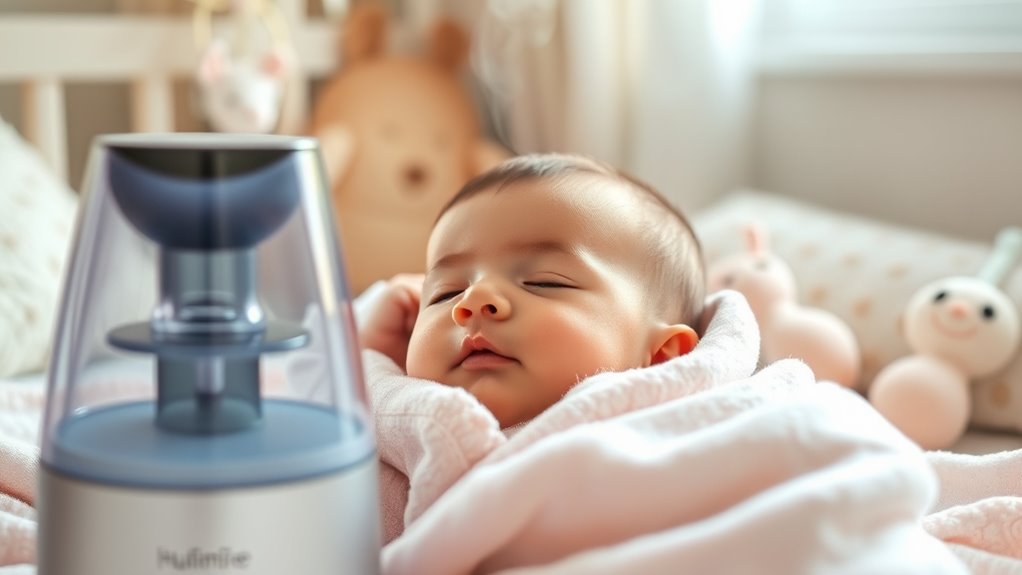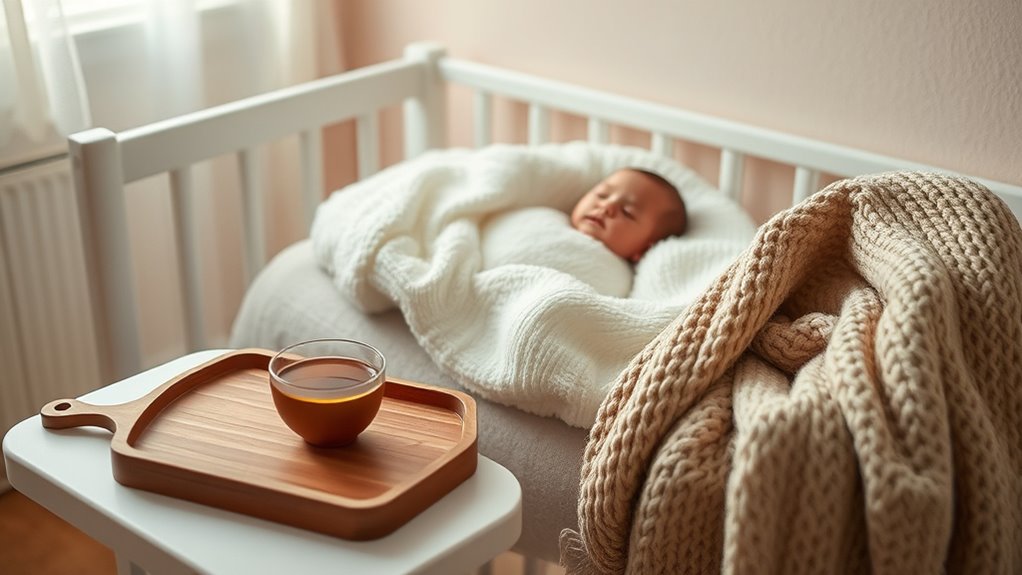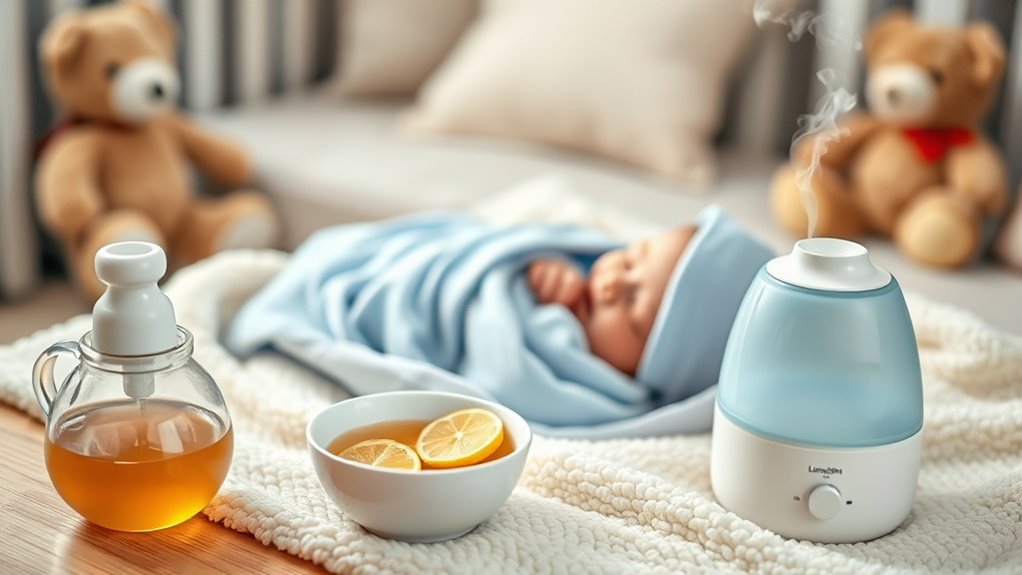If your baby has cold or flu symptoms like a runny nose, cough, or a mild fever, focus on keeping them comfortable with gentle remedies. Offer plenty of fluids, use a humidifier, and try safe nasal suction or saline drops to ease congestion. Warm baths and light clothing can help with comfort. Watch for signs of worsening, like difficulty breathing or high fever. Continuing with these tips can help you get your little one back on the mend safely.
Key Takeaways
- Use gentle, frequent hydration with electrolyte drinks, broths, and breastfeeding to keep your baby hydrated and supported.
- Maintain humidity with a clean cool-mist humidifier and use saline drops or bulb suction for nasal congestion relief.
- Offer warm baths, light clothing, and nutritious, easy-to-digest foods to soothe symptoms and promote rest.
- Monitor your baby’s temperature regularly, use appropriate fever reducers, and watch for signs of difficulty breathing or dehydration.
- Seek medical attention promptly if your baby has difficulty breathing, a persistent high fever, or shows signs of dehydration or unresponsiveness.
Recognizing Common Cold and Flu Symptoms in Babies

Babies often show signs of a cold or flu through subtle changes in their behavior and physical appearance. You might notice their baby sleep patterns shift—they may sleep more or have trouble settling down. These changes can signal that their immune system development is fighting off an infection. Look for other symptoms like a runny nose, sneezing, or a slight fever. Your baby may also become more irritable or fussy, and their appetite might decrease. Keep an eye on their breathing—wheezing or difficulty breathing warrants immediate attention. Recognizing these early signs helps you respond quickly and seek appropriate care. Since their immune system is still developing, your baby is more vulnerable, so staying alert to these symptoms is vital for their health. Monitoring indoor air quality can also help reduce airborne irritants that may exacerbate respiratory issues. Additionally, understanding common cold and flu symptoms in babies can aid in timely detection and management. Being aware of how immune system development impacts symptom severity can help you better support your baby’s recovery. Regularly consulting with your pediatrician about vaccination schedules can further protect them from preventable illnesses.
Keeping Your Baby Hydrated With Gentle Fluids

When your baby is sick, keeping them hydrated is vital. You can offer electrolyte drinks or clear broths to help replenish lost fluids gently. These options are easy on their stomach and support their recovery.
Offer Electrolyte Drinks
During a cold or flu, offering electrolyte drinks can be an effective way to keep your baby hydrated without overwhelming their delicate stomach. Electrolyte drinks help restore lost minerals and fluids, supporting your baby’s baby sleep and boosting their baby immunity. When choosing a suitable drink, consider these options:
- Use specially formulated electrolyte solutions designed for infants.
- Offer small, frequent sips to prevent vomiting or discomfort.
- Monitor your baby’s hydration levels and watch for signs of improvement or dehydration.
These gentle fluids help maintain hydration balance, aiding your baby’s recovery. Remember, while electrolyte drinks are beneficial, they should complement other supportive care and not replace medical advice. Always consult your pediatrician if you’re unsure about your baby’s condition or hydration needs.
Use Clear Broths
Using clear broths can be an excellent way to keep your baby hydrated when they’re under the weather. Clear broths, like chicken or vegetable, provide fluids and electrolytes that help prevent dehydration. They’re gentle on your baby’s stomach and easy to digest. If your baby is breastfeeding, remember that breast milk remains essential for hydration and nutrition, making the importance of breastfeeding clear. As your baby recovers, consider vitamin supplementation to support their immune system, but always consult your pediatrician first. Clear broths can also be a comforting addition, helping soothe a sore throat. Keep offering small amounts frequently, and watch for signs of improved hydration. Incorporating nutritional support such as appropriate vitamins can further aid recovery. Ensuring a hygienic environment can help prevent the spread of germs and support your baby’s health. Maintaining proper hydration levels is vital, especially during illness, to assist in recovery and prevent complications. Proper hydration can also support your baby’s immune response and overall healing process. Additionally, understanding angel numbers related to health and healing can provide comforting spiritual guidance during recovery. Combining these gentle fluids with breastfeeding and proper vitamin intake supports your baby’s recovery process safely.
Using Humidifiers and Steam to Ease Congestion

Humidifiers and steam can be effective tools for relieving congestion in your baby’s cold or flu. Using a cool-mist humidifier helps maintain ideal humidity levels, but always prioritize humidifier safety to prevent mold and bacteria buildup. Steam inhalation can also soothe nasal passages when done carefully. To use these methods effectively:
- Keep the humidifier clean to prevent mold and bacteria growth.
- Use a cool-mist humidifier rather than hot steam to avoid burns.
- If opting for steam inhalation, hold your baby safely and never leave them unattended near hot steam.
- Being aware of the wood-burning environmental impacts is crucial if you need to move or adjust equipment in your home to ensure safety.
- It’s also important to consider humidifier safety guidelines to prevent potential health risks associated with improper use. Proper maintenance of humidifiers can help reduce the risk of bacterial growth, ensuring a safer environment for your baby.
- Regularly checking the air quality in your home can further improve your baby’s respiratory comfort.
These approaches can ease breathing, but always monitor your baby closely and consult your pediatrician if symptoms worsen or persist. Proper use of humidifiers and steam can make a noticeable difference in your baby’s comfort.
Gentle Nasal Clearing Techniques for Babies

Using safe suction methods can help clear your baby’s blocked nose without causing discomfort. Pairing this with a humidifier can keep the air moist, easing congestion and making breathing easier. Together, these gentle techniques provide effective relief while ensuring your little one stays comfortable. Additionally, practicing effective communication can help you better understand your baby’s needs and respond appropriately. Incorporating a home environment optimized for comfort can further support your child’s recovery and well-being. Staying informed about industry transformations like AI automation can also help in managing health resources more efficiently. For additional support, consider exploring free crypto opportunities to discover new tools that can assist in managing your health resources more effectively.
Safe Suction Methods
When your baby has a stuffy nose, gentle nasal suction can provide relief, but it’s important to do it safely. Proper nasal suctioning helps clear mucus without causing discomfort or injury. Here are three safe methods to try:
- Use a bulb syringe with gentle, steady pressure—avoid squeezing too hard.
- Position your baby’s head slightly tilted back to ease mucus removal.
- Insert the tip just inside the nostril, not too deep, and gently suction out mucus.
Always clean the bulb syringe thoroughly after each use to prevent infections. Stick to gentle, controlled movements during nasal suctioning, and never force mucus out. If your baby shows signs of distress, stop and consult a doctor.
Humidifier Use Benefits
Adding moisture to the air can considerably ease your baby’s nasal congestion, making it easier for them to breathe. Using a humidifier helps maintain ideal humidity levels, preventing dryness that can worsen cold symptoms. When choosing a humidifier, prioritize safety by selecting models with automatic shut-off and cleaning features to prevent mold growth. Keep humidity between 40-60% for comfort and safety. Here’s a quick comparison:
| Feature | Benefits | Tips |
|---|---|---|
| Cool mist humidifier | Safe for babies, easy to clean | Use distilled water |
| Warm mist humidifier | Provides additional warmth | Avoid boiling water unattended |
| Humidity monitor | Maintains optimal humidity | Use with a hygrometer |
| Safety features | Prevents accidents | Regular cleaning |
| Size & capacity | Suitable for room size | Choose appropriately |
Proper humidifier use can ease nasal congestion safely. Additionally, selecting a preppy dog name can add a touch of style and sophistication if you’re a pet owner. It is also important to regularly monitor the humidity levels with a humidity monitor to ensure a safe and comfortable environment for your baby. Using ultraviolet (UV) sanitization features in your humidifier can further reduce the risk of microbial growth, ensuring cleaner air for your little one. Maintaining a clean humidifier also contributes to preventing mold growth and overall air quality.
Providing Comfort With Warm Baths and Light Clothing

A warm bath can provide soothing relief and help your baby feel more comfortable when they have a cold or flu. It can also ease congestion and relax their muscles. Keep the bath lukewarm—not hot—and stay with your baby at all times. To maximize comfort, consider these tips:
- Use light, breathable clothing to prevent overheating and keep your baby comfortable.
- Keep an eye on their diaper area; a warm bath can help soothe diaper rash but avoid long baths that may cause dryness.
- Let your baby crawl around gently after the bath to stretch their muscles and promote better sleep.
Always dry your baby thoroughly, especially in skin folds, to prevent diaper rash, and avoid overdressing to keep them from overheating.
Offering Nutritious, Easy-to-Digest Foods

When your baby is sick, offering gentle, nutritious foods can help support their recovery. Choose easy-to-digest meals that won’t upset their stomach or cause discomfort. These simple options keep your little one nourished and comforted during their illness.
Gentle, Nutritious Options
During a cold or flu, offering gentle, nutritious foods can help soothe your baby’s discomfort and support recovery. Focus on options that are easy to swallow and nourishing. Consider these tips:
- Offer warm, diluted fruit or vegetable purees to keep your baby hydrated and provide essential vitamins.
- Include small amounts of breastfeeding tips like breast milk or formula, which boost baby immune support and are easy to digest.
- Use smoothies or well-mashed soft foods to provide calories without overwhelming your baby’s sensitive stomach.
These choices help maintain nourishment while reducing congestion or soreness. Always watch for signs of dehydration or increased discomfort, and consult your pediatrician if needed. Gentle, nutritious options support your baby’s recovery and overall well-being.
Easy-to-Digest Meals
Offering nutritious, easy-to-digest foods during your baby’s illness helps them recover comfortably and stay nourished. When planning meals, focus on gentle options like pureed fruits, mashed vegetables, and clear broths. Feeding tips include offering small, frequent meals rather than large portions, which can be overwhelming. Keep textures soft and avoid spicy or greasy foods that might upset their stomach. Incorporate familiar, comforting flavors to encourage eating. Proper meal planning ensures your baby gets essential nutrients without taxing their digestive system. Always pay attention to their cues and adjust as needed. Staying consistent with easy-to-digest foods helps support their immune system and speeds recovery, making the process less stressful for both of you.
Ensuring Rest and Creating a Calm Environment

Creating a calm environment and ensuring your baby gets plenty of rest are essential steps in helping them recover from a cold or flu. A comfortable sleep environment can make a big difference. To promote better rest, consider these calming techniques:
- Keep the room quiet and dim to reduce stimulation.
- Use a humidifier to add moisture to the air, easing congestion.
- Establish a soothing bedtime routine, like gentle rocking or soft singing.
These steps help your baby relax and breathe easier, supporting their immune system. Prioritizing a peaceful sleep environment encourages restful sleep, which is crucial for recovery. Remember, a calm atmosphere not only benefits their physical health but also helps soothe their discomfort during illness.
Natural Remedies and Safe Baby-Approved Alternatives

When your baby has a cold or flu, natural remedies and safe, baby-approved alternatives can help alleviate symptoms without resorting to medication. Herbal teas, such as chamomile or ginger, can soothe sore throats and ease congestion when prepared appropriately and given in small amounts. Always guarantee teas are cooled and diluted to a safe temperature. You might also consider alternative therapies like gentle massage or vapor inhalation to loosen mucus and promote comfort. Using a humidifier adds moisture to the air, easing breathing difficulties. Remember, always consult your pediatrician before trying new remedies, especially herbal options. These natural approaches can support your baby’s recovery while minimizing risks, providing relief in a safe, nurturing way.
Monitoring Your Baby’s Temperature and Managing Fever

Keeping track of your baby’s temperature is a key step in managing their illness and ensuring they stay comfortable. Use a reliable thermometer to check frequently, especially if they show signs of teething discomfort or diaper rash. Here are three essential tips:
- Use a digital rectal thermometer for the most accurate readings.
- Record temperatures to monitor trends and identify when fever worsens.
- Keep your baby hydrated and dress them in lightweight clothing to help manage fever.
If your baby’s temperature rises above 100.4°F (38°C), consider fever-reducing remedies like infant acetaminophen, but always follow the dosage instructions. Managing fever helps reduce discomfort from teething and prevents diaper rash from worsening due to excess moisture.
Signs That Indicate It’s Time to Seek Medical Attention

If your baby shows signs of worsening illness or unusual symptoms, it’s important to seek medical attention promptly. While home remedies can help alleviate mild cold and flu symptoms, certain signs require professional care. Watch for difficulty breathing, persistent high fever, or if your baby becomes lethargic or unresponsive. Severe vomiting, dehydration (such as a dry mouth or no tears when crying), or a rash also indicate urgent medical intervention. If your baby’s symptoms worsen despite home remedies or they don’t improve within a few days, consult a healthcare provider. Trust your instincts—timely medical attention can prevent complications and ensure your baby receives the right treatment when needed. Always prioritize professional care when symptoms escalate or are concerning.
Frequently Asked Questions
How Can I Differentiate Between a Cold and Flu in My Baby?
To tell apart a cold from the flu in your baby, look at symptom differences. A cold usually causes mild symptoms like a runny nose and slight cough, while the flu often brings a high fever, chills, and body aches. If your baby’s fever is severe or symptoms worsen quickly, it’s best to see a doctor promptly. Trust your instincts and monitor their overall behavior and comfort level.
Are There Any Home Remedies That Can Prevent My Baby From Getting Sick?
Think of your baby’s health as a delicate garden. To keep it thriving, focus on boosting their natural immunity through nutritious foods and ample sleep. Regular hygiene practices, like gentle handwashing, act as protective fences against germs. While no remedy guarantees prevention, these routines create a sturdy shield, helping your little one stay healthy and resilient. Nurturing these habits now sets the foundation for a strong, vibrant future.
What Are the Risks of Giving Over-The-Counter Medicines to Babies?
You should be cautious with over-the-counter medicines for your baby because they can cause medication side effects and pose dosage concerns. Giving the wrong dose might lead to adverse reactions or toxicity. Always consult your pediatrician before administering any medication, as their guidance guarantees safe use. Never guess the dosage, and avoid adult medicines, which can be dangerous for babies. Your doctor can recommend safe, effective options tailored for your child’s age and weight.
How Long Should I Wait Before Taking My Baby to the Doctor?
You should see a doctor if your baby’s fever lasts more than 24 hours or if they show signs of distress. For fever management, use age-appropriate dosing and monitor their temperature regularly. Guarantee proper hydration with fluid intake and follow hydration tips to keep your baby comfortable. If symptoms worsen or you’re unsure, don’t hesitate to seek medical advice promptly to keep your baby safe.
Can My Baby Recover Fully at Home Without Antibiotics?
Think of your baby’s recovery as a delicate garden needing gentle care. With proper home care and immune support, your little one can often bounce back from a cold or flu. Rest, fluids, and comfort nurture their strength. While antibiotics aren’t always necessary, monitor their symptoms closely. If they worsen or linger, don’t hesitate to seek medical advice. Trust your instincts—most babies do recover fully at home with tender, attentive care.
Conclusion
Think of your baby’s health as tending a delicate garden. With gentle care, the right remedies, and keen observation, you nurture their resilience and help them bloom back to health. When symptoms linger or worsen, it’s like weeds threatening your garden’s beauty—you’ll want expert help to restore harmony. Trust your instincts, stay attentive, and know that with patience and care, your little one will soon be back to thriving in their vibrant, healthy garden.










